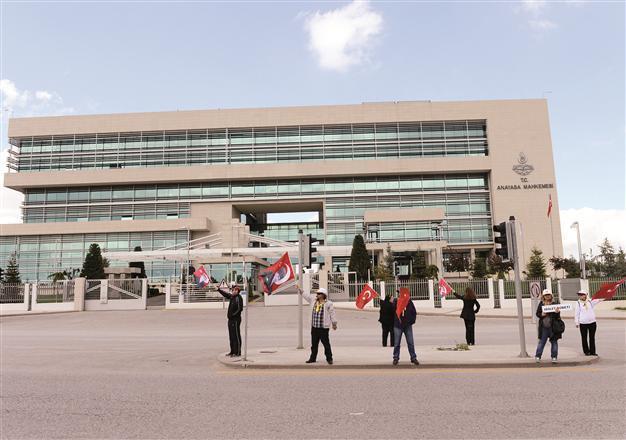Some 17,000 persons pin their hopes on Turkey's top court
ANKARA

A group of people hold Turkish flags in front of the Constitutional Court building in Ankara in protest of the court’s lack of decision for come coup plot case convicts. Turkish government initiated individual access to the top court. AA Photo
Some 17,000 people representing a wide variety of backgrounds have filed individual appeals to the top court of Turkey since individual access to the top court became effective as of Sept. 24, 2012.
Prime Minister Recep Tayyip Erdoğan, U.S.-based Islamic preacher Fethullah Gülen, jailed leader of the outlawed Kurdistan Workers’ Party (PKK) Abdullah Öcalan and singer Deniz Seki are among those applicants, the Anadolu Agency reported on May 27.
Turkey’s Constitutional Court, which has since September 2012, finalized 7,000 of those applicants so far, has recently gained increasing visibility due to the crucial decisions it has made, such as its April 2 ruling concerning Turkey’s block on accessing Twitter.
On April 2, the Constitutional Court said the block violated freedom of expression and individual rights. The ruling marked the most significant legal challenge yet to the ban, which caused public uproar and international condemnation.
The Telecommunications Directorate (TİB) blocked access to Twitter on March 21 after Erdoğan said he would “root out” the network, following a stream of anonymously posted audio tapes purporting to expose corruption in his inner circle days ahead of the March 30 local elections.
Ironically, it was Erdoğan’s government that initiated individual access to the top court as part of a set of reforms that were voted on in the Sept. 12 referendum in 2010 – reforms that were carried out as part of Turkey’s bid for full EU membership.
Since September 2012, Turkish citizens have the right to personally apply to the Constitutional Court based on alleged violations with regard to their fundamental rights and freedoms guaranteed by the Constitution and the European Convention on Human Rights (ECHR).
Crucial rulingsThe plight of eight lawmakers, two from the main opposition Republican People’s Party (CHP), one from the Nationalist Movement Party (MHP) and five from the Peace and Democracy Party (BDP) who were under arrest pending trial when they were elected to Parliament in 2011, was resolved through the court with the exception of the MHP deputy who has been, in the meantime, convicted. Six of the rest seven deputies have been released with a ruling in December 2013 that said CHP deputy Mustafa Balbay’s pre-trial detention period of more than four years had violated his rights. The ruling about Balbay also paved the way for the release of five BDP deputies.
A high-profile suspect in the ongoing Ergenekon coup plot case, former Chief of General Staff retired Gen. İlker Başbuğ was released in early March upon a ruling from the court that his imprisonment was a “rights violation,” on the ground that the detailed reasoning regarding his conviction was not issued until seven months after the verdict.
PKK leader, coup leadersOn April 18, Prime Minister Erdoğan appealed to the court, complaining that court rulings ordering the withdrawal of social media content violating his and his family’s rights were not being implemented.
Most recently, Gülen, whose followers have been in a severe conflict with Erdoğan and his government, has appealed to the court, complaining that a local court refused to take action on “slanderous” reports about him.
The court has recently been reviewing an appeal from Aziz Yıldırım, the president of Fenerbahçe Sports Club, whose appeal into his six-year, three-month match-fixing case was rejected by the Supreme Court of Appeals in January and is facing at least two more years in prison.
Famous pop singer Seki, whose conviction to six years and three months in prison for “drug trafficking” was approved by the Supreme Court of Appeals, is another applicant waiting for the Constitutional Court’s say about her individual appeal.
Öcalan has appealed to the court, arguing his rights were violated because his book titled “Kurdistan Revolution Manifesto, the Kurdish Issue and Democratic Nation Resolution [Defending Kurds in the Grips of Cultural Genocide]” was seized just as it reached the publishing phase.
Kenan Evren, the leader of the notorious Sept. 12, 1980 military coup d’état, and then-commander of the Air Force, Tahsin Şahinkaya, who have been on trial since April 2012 due to their roles in the infamous coup, have also appealed to the court, arguing that their rights were violated due to the trial.
